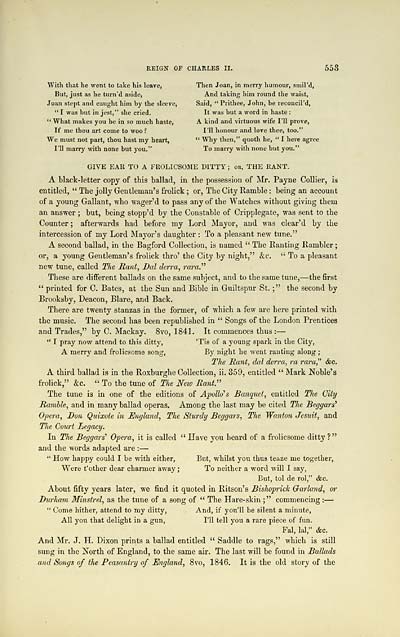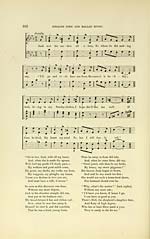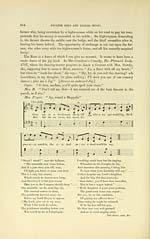Glen Collection of printed music > Printed text > Popular music of the olden time > Volume 2
(177) Page 553 - Give ear to a frolicsome ditty; or, The rant
Download files
Complete book:
Individual page:
Thumbnail gallery: Grid view | List view

REIGN OF CHARLES II. 558
With that he went to take his leave, Then Joan, in merry humour, smil'd,
But, just as he turn'd aside, And taking him round the waist,
Joan stept and caught him by the sleeve, Said, " Prithee, John, be reconcil'd,
" I was but in jest," she cried. It was but a word in haste :
" What makes you be in so much haste, A kind and virtuous wife I'll prove,
If me thou art come to woo? I'll honour and love thee, too."
We must not part, thou hast my heart, " Why then," quoth he, " I here agree
I'll marry with none but you." To marry with none but you."
GIVE EAR TO A FROLICSOME DITTY ; or, THE RANT.
A black-letter copy of this ballad, in the possession of Mr. Payne Collier, is
entitled, " The jolly Gentleman's frolick ; or, The City Ramble : being an account
of a young Gallant, who wager'd to pass any of the Watches without giving them
an answer ; but, being stopp'd by the Constable of Cripplegate, was sent to the
Counter ; afterwards had before my Lord Mayor, and was clear'd by the
intercession of my Lord Mayor's daughter : To a pleasant new tune."
A second ballad, in the Bagford Collection, is named " The Banting Bambler ;
or, a young Gentleman's frolick thro' the City by night," &c. " To a pleasant
new tune, called The Rant, Dal derra, rara."
These are different ballads on the same subject, and to the same tune, — the first
" printed for C. Bates, at the Sun and Bible in Guiltspur St. ;" the second by
Brooksby, Deacon, Blare, and Back.
There are twenty stanzas in the former, of which a few are here printed with
the music. The second has been republished in " Songs of the London Prentices
and Trades," by C. Mackay. 8vo, 1841. It commences thus : —
" I pray now attend to this ditty, 'Tis of a young spark in the City,
A merry and frolicsome song, By night he went ranting along ;
The Rant, dot derra, ra rara," &c.
A third ballad is in the Roxburghe Collection, ii. 359, entitled " Mark Noble's
frolick," &c. " To the tune of The Neiv Rant."
The tune is in one of the editions of Apollo's Banquet, entitled Tlie City
Ramble, and in many ballad operas. Among the last may be cited The Beggars'
Opera, Bon Quixote in England, The Sturdy Beggars, The Wanton Jesuit, and
Tlie Court Legacy.
In The Beggars' 1 Opera, it is called " Have you heard of a frolicsome ditty ?"
and the words adapted are : —
" How happy could I be with either, But, whilst you thus teaze me together,
Were t'other dear charmer away ; To neither a word will I say,
But, tol de rol," &c.
About fifty years later, we find it quoted in Ritson's BishopricJc Garland, or
Durham Minstrel, as the tune of a song of " The Hare-skin ;" commencing : —
" Come hither, attend to my ditty, And, if you'll be silent a minute,
All you that delight in a gun, I'll tell you a rare piece of fun.
Fal, lal," &c.
And Mr. J. H. Dixon prints a ballad entitled " Saddle to rags," which is still
sung in the North of England, to the same air. The last will be found in Ballads
and Songs of the Peasantry of England, 8vo, 1846. It is the old story of the
With that he went to take his leave, Then Joan, in merry humour, smil'd,
But, just as he turn'd aside, And taking him round the waist,
Joan stept and caught him by the sleeve, Said, " Prithee, John, be reconcil'd,
" I was but in jest," she cried. It was but a word in haste :
" What makes you be in so much haste, A kind and virtuous wife I'll prove,
If me thou art come to woo? I'll honour and love thee, too."
We must not part, thou hast my heart, " Why then," quoth he, " I here agree
I'll marry with none but you." To marry with none but you."
GIVE EAR TO A FROLICSOME DITTY ; or, THE RANT.
A black-letter copy of this ballad, in the possession of Mr. Payne Collier, is
entitled, " The jolly Gentleman's frolick ; or, The City Ramble : being an account
of a young Gallant, who wager'd to pass any of the Watches without giving them
an answer ; but, being stopp'd by the Constable of Cripplegate, was sent to the
Counter ; afterwards had before my Lord Mayor, and was clear'd by the
intercession of my Lord Mayor's daughter : To a pleasant new tune."
A second ballad, in the Bagford Collection, is named " The Banting Bambler ;
or, a young Gentleman's frolick thro' the City by night," &c. " To a pleasant
new tune, called The Rant, Dal derra, rara."
These are different ballads on the same subject, and to the same tune, — the first
" printed for C. Bates, at the Sun and Bible in Guiltspur St. ;" the second by
Brooksby, Deacon, Blare, and Back.
There are twenty stanzas in the former, of which a few are here printed with
the music. The second has been republished in " Songs of the London Prentices
and Trades," by C. Mackay. 8vo, 1841. It commences thus : —
" I pray now attend to this ditty, 'Tis of a young spark in the City,
A merry and frolicsome song, By night he went ranting along ;
The Rant, dot derra, ra rara," &c.
A third ballad is in the Roxburghe Collection, ii. 359, entitled " Mark Noble's
frolick," &c. " To the tune of The Neiv Rant."
The tune is in one of the editions of Apollo's Banquet, entitled Tlie City
Ramble, and in many ballad operas. Among the last may be cited The Beggars'
Opera, Bon Quixote in England, The Sturdy Beggars, The Wanton Jesuit, and
Tlie Court Legacy.
In The Beggars' 1 Opera, it is called " Have you heard of a frolicsome ditty ?"
and the words adapted are : —
" How happy could I be with either, But, whilst you thus teaze me together,
Were t'other dear charmer away ; To neither a word will I say,
But, tol de rol," &c.
About fifty years later, we find it quoted in Ritson's BishopricJc Garland, or
Durham Minstrel, as the tune of a song of " The Hare-skin ;" commencing : —
" Come hither, attend to my ditty, And, if you'll be silent a minute,
All you that delight in a gun, I'll tell you a rare piece of fun.
Fal, lal," &c.
And Mr. J. H. Dixon prints a ballad entitled " Saddle to rags," which is still
sung in the North of England, to the same air. The last will be found in Ballads
and Songs of the Peasantry of England, 8vo, 1846. It is the old story of the
Set display mode to: Large image | Transcription
Images and transcriptions on this page, including medium image downloads, may be used under the Creative Commons Attribution 4.0 International Licence unless otherwise stated. ![]()
| Special collections of printed music > Glen Collection of printed music > Printed text > Popular music of the olden time > Volume 2 > (177) Page 553 - Give ear to a frolicsome ditty; or, The rant |
|---|
| Permanent URL | https://digital.nls.uk/91364118 |
|---|
| Shelfmark | Glen.254a |
|---|---|
| Additional NLS resources: | |
| Attribution and copyright: |
|
| Description | Scottish songs and music of the 18th and early 19th centuries, including music for the Highland bagpipe. These are selected items from the collection of John Glen (1833 to 1904). Also includes a few manuscripts, some treatises, and other books on the subject. |
|---|
| Description | The Glen Collection and the Inglis Collection represent mainly 18th and 19th century Scottish music, including Scottish songs. The collections of Berlioz and Verdi collected by bibliographer Cecil Hopkinson contain contemporary and later editions of the works of the two composers Berlioz and Verdi. |
|---|

